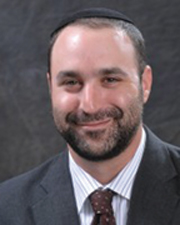 Can you define a religious Jew? It’s quite possible your definition is different than that of Rabbi Aaron L. Alexander, the featured speaker for Congregation Beth Shalom’s Sisterhood Shabbat/Kaplan Scholar-in-Residence weekend Jan. 17-18. (For complete information regarding the weekend, see below.)
Can you define a religious Jew? It’s quite possible your definition is different than that of Rabbi Aaron L. Alexander, the featured speaker for Congregation Beth Shalom’s Sisterhood Shabbat/Kaplan Scholar-in-Residence weekend Jan. 17-18. (For complete information regarding the weekend, see below.)
In fact “Redefining ‘Religious’ ” is one of Rabbi Alexander’s topics for the weekend.
“I think one of the terms that has been hijacked in religious life is what is a religious Jew,” he said in a recent phone interview.
The rabbi, who was ordained in 2006, serves as associate dean of the university’s Ziegler School of Rabbinic Studies. He lectures on rabbinics and Jewish law and said he believes when most people hear the word religious Jew they automatically think of a man with a beard and a hat. He said most characterize anyone who fits any other description as not religious and is, in fact, some other form of Judaism. The rabbi personally believes quite differently.
“The religious Jew is the one who in any moment in his or her life decides that the Torah will offer an answer. In that moment that person is a religious person,” he said.
Along those lines, the Conservative rabbi is often asked if he has a definition of a good Jew.
“I used to say no, that’s a ridiculous question. But I think there are some reasonable answers to what makes a good Jew. One of those is does your tradition ever have a veto in the choices that you make in life?
“Because the moment of decision-making, with the tradition as the background, the backdrop, that moment becomes a religious moment for somebody. I think we’ve gotten to a place where people assume it’s all or nothing and everything in between is too complicated to figure out and it’s none of those things. It’s not all, it’s not nothing and it’s actually not too complicated to figure out,” he explained.
Noting that Jewish tradition has been providing us with answers for 2,000 years, Rabbi Alexander said those answers need to be finessed in order to fit the day in which we live.
“So the text that I will be teaching over the weekend will be amplifying specific examples of that to a certain extent but also teaching the questions that one needs to ask in order to see themselves as a religious person. Ultimately that’s what I want. I want Jews to understand that when they make decisions based on their tradition they are making religious decisions,” he said.
Rabbi Alexander is a certified mashgiach (kashrut supervisor) and a prolific writer. He is a regular contributor to the Huffington Post and the Sh’ma Online Journal, commenting starkly on current social issues through the lens of Torah. Rabbi Alexander also contributed traditional text chapters to the first three editions of the JPS series, “Jewish Choices, Jewish Voices.”
He spends his summers as rabbi in residence at Camp Ramah in California along with his spouse Rabbi Penina Podwol Alexander. The couple have two sons, 3-year-old Ariel and newborn Eliav. He was also a founding staff member at Camp Ramah Darom in 1997, where he met Beth Shalom’s Rabbi David Glickman and his wife Annie.
“He has always been an energetic and dynamic leader and teacher. Since his studies at the Conservative yeshiva in Jerusalem, the Jewish Theological Seminary (where he received his master’s degree in Talmud), and his rabbinic ordination from the Ziegler School of Rabbinic Studies at the American Jewish University (formerly the University of Judaism), Rabbi Alexander has become one of Conservative Judaism’s most sought after young teachers and speakers,” Rabbi Glickman said.
“Rabbi Alexander is the associate dean of the Ziegler school, and has a direct impact on creating the next generation of leaders for Conservative Judaism. He brings other passions to the table as well. He is one of the youngest rabbis to ever sit on the Conservative Movement’s Committee of Jewish Law and Standards. Additionally, he is a nationally recognized faith leader who is championing the fight against gun deaths in America,” Rabbi Glickman continued.
Rabbi Alexander said throughout the weekend he will speak unapologetically about what he thinks religious life can look like both individually and communally, “but also in relationship with God.”
The final topic of the weekend is a vision for a religious community beyond boundaries. He said his final speech will, to an extent, tie together all his previous presentations.
“I will be talking about a community and its boundaries and the way in which we perceive people in our community and ourselves in community and how together we become stronger with diversity. There’s a direct impact between what leadership looks like, how people see themselves as religious and in what ways they are religious and how people form a community around that kind of diversity when it’s not all or nothing and when it’s not just too complicated and we’ll have to give up,” Rabbi Alexander said.
Torah, he said, will be a part of every single discussion he has during the weekend.
“Each and every person, Jew and non, but in this case for Jews, has their own Torah. It’s something that is inspired by our tradition and our communities and our relationship with God that is uniquely there that nobody else owns. When they find that Torah, religious life usually falls in lock step with what that Torah is, that core message, the core piece of wisdom that they hear through the tradition of God speaking to them. To a certain extent, the conversations, the text that we look at, we will be workshopping, each one of us finding that piece of Torah inside of us.”



